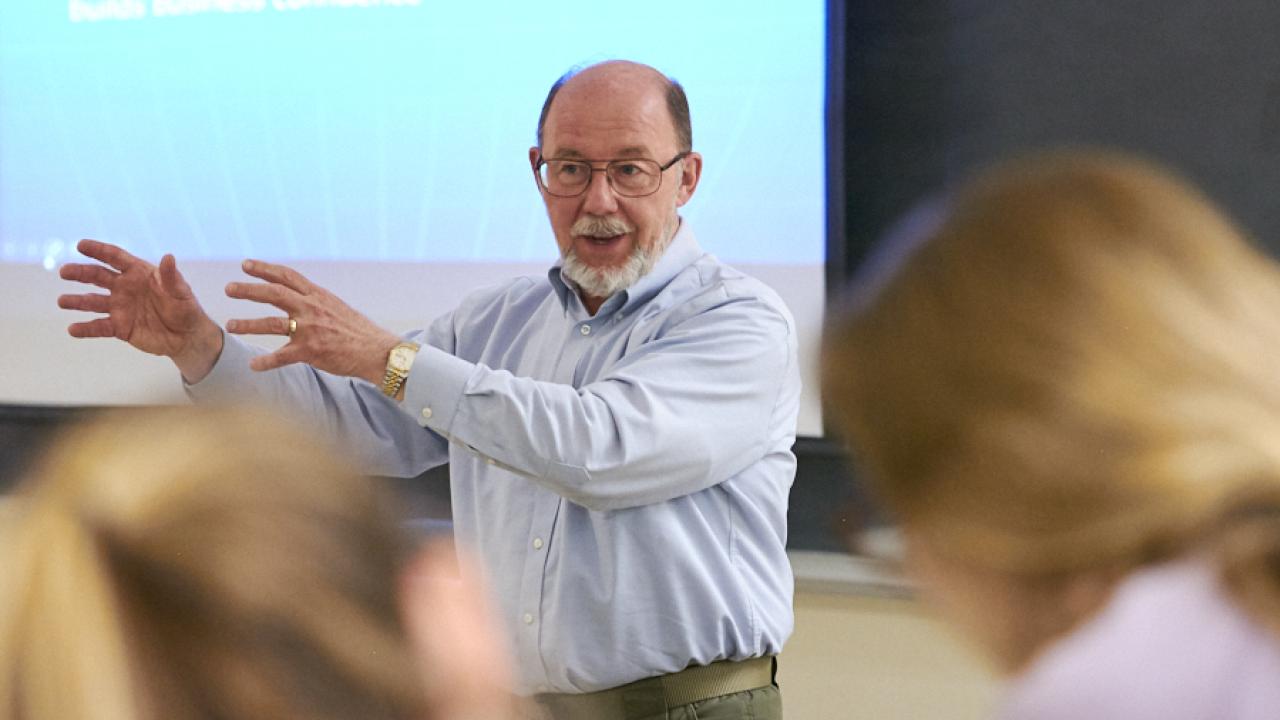Get to know the Augustana University retiring professor of Government/International Affairs and Political Science, Joe Dondelinger.
Q: Where are you originally from and where did you get your education?
A: I’m originally from the small country of Luxembourg. At 17, I spent a year as a high school exchange student in Painesville, Ohio. Interestingly, Ohio’s Miami University had an overseas campus in Luxembourg through which I applied to study at Miami’s main campus in Oxford, Ohio, where I received my bachelor of arts in political science. I continued my education earning a M.A. and a Ph.D. in international relations, international economics, and comparative politics from the Pennsylvania State University in State College, Pennsylvania.
Q: Why did you choose Augustana as your professional home?
A: When I applied to Augustana I was an assistant professor at Penn State with non-resident alien status. Augustana had a two-year leave replacement position that I was allowed to compete for, under then immigration law, as post-doctoral training. I had several years of teaching experience at a major university (and, incidentally, at a correctional facility near State College) and two stints as a member of Luxembourg’s mission to the United Nations under my belt by then. To his eternal regret, Dr. Schotten hired me and the position eventually turned into a tenure track one. All kidding aside, I have been truly blessed to be able to spend my professional career with a colleague and friend like Peter Schotten.
Q: Describe your time here at Augustana.
A: Besides teaching in the Government and International Affairs Department, from 1985 to 2011, I served as an adjunct faculty member at Federal Executive Institute in Charlottesville, Virginia, the U.S. government’s senior civil service training institute. Over that time I taught nearly 140 week-long courses, first on Soviet and Russian politics and, starting in the mid-1990s, on racial, ethnic, religious, cultural and nationalist conflicts. I was able to work with policymakers from all agencies of the U.S. government, a fascinating real life, policy-heavy corrective to academic theorizing. The high/low mix of interacting with senior policy makers and undergraduate students provided a nice professional balance. And the FEI work translated directly into the Augustana curriculum with courses on Soviet and Russian politics as well as on identity politics.
Q: What's the best part about your job?
A: Without a doubt my colleagues in my department through the years and their professional and human qualities. There are people I describe as ‘mensch’ — real decent human beings, intellectually sharp and open-minded; they are political bridge builders not ideologues. They understood that an academic’s role is inquiry and questioning particularly of the prevailing truths including in academia. I also have great admiration for people like incoming student body president and vice president Luca Amayo and Audrey Cope. They are trying to be bridge-builders.
Q: What do you hope people will remember about you?
A: I am not much concerned about 'legacy.' I do hope that the students I have taught will realize, over the long haul, that I’ve prepared them for how the world works and not just tried to convince them of how the world should work according to the latest 'critical' insights generated within the academic bubble or social trend. The success of my students is legacy enough.
Q: What are your plans for retirement?
A: I grew up in the hilly terrain of Luxembourg’s Ardennes. I loved the Appalachians in State College, Pennsylvania, and Charlottesville, Virginia. Hence the move to the Black Hills. I do not intend to be mentally or physically inactive. Boredom, or a lack of imagination, is not in my nature and not an acceptable option.
Q: Any advice you want to leave with us?
A: I told my students to forget about changing the world, but to work hard at creating order (psychological, moral, professional, organizational, etc.) within their immediate environment and take it from there. I told them to remember there is never a free lunch and not to judge themselves by their own good and noble intentions but by the consequences of their ideas and actions. As for my colleagues and administrators, tell students what they need to be equipped with to survive, not what they want to hear.
